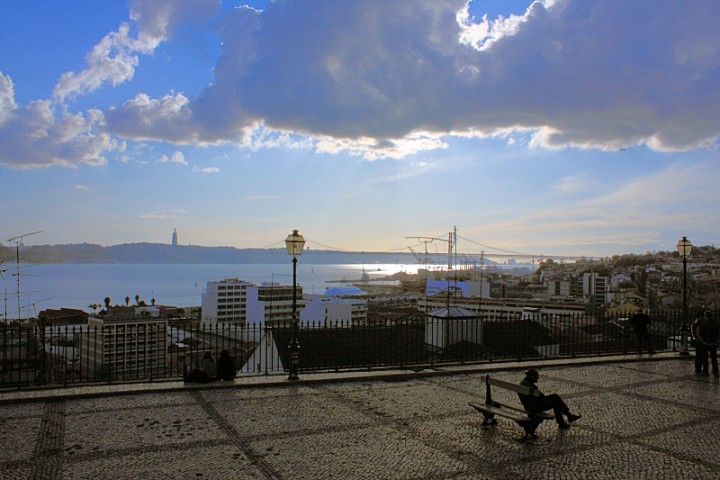The Times recently published a survey of 885 property investors, undertaken by PwC and the Urban Land Institute, which placed Lisbon as the number one European hotspot for investment in 2019. The city had jumped up from eleventh place in the same survey the previous year.
And no wonder: the tourism boom that Portugal is currently experiencing is heavily concentrated in the capital. But more than the tourism itself, it is the orgy of property speculation engulfing the city – stemming both from the rising number of visitors to Lisbon and, more fundamentally, the sweeping liberalisation of the Portuguese housing market – that has investors licking their lips.
A report by the Observatory of Crisis and Alternatives in Portugal found that, in the month of June 2018 alone, around 200 real estate funds generated 11 million euros. Between 2014 and 2018, the number of housing-related transactions increased two-and-half times over. This inflating bubble has worried the International Monetary Fund, who last July warned of “significant imbalances accumulating in some areas of Portuguese real estate”. The Bank of Portugal, who had long denied the significance of such warnings, had to admit that the rise of Portuguese house prices by 32 percent nominally and 27 percent in real terms over a four-year-period was a threat to the country’s “financial stability”.
What the financial strategists of the international and Portuguese bourgeoisie mean by such premonitions is that the vast amounts of money being poured into property is creating a bubble, whereby the valuation of housing and tourist accommodation far outstrips the market’s means of absorbing it. For one thing, tourist numbers in Portugal are already beginning to level out. And for another, hundreds of thousands if not millions of Portuguese people are now being priced out of both the housing and the rental market of central Lisbon and Porto. Not that the financiers and big landlords care – so long as they can park their uninvested capital somewhere where its value is likely to increase for the foreseeable future. And from their point of view, the future does not have to be very foreseeable!
There has been a 25 percent increase in the number of people officially listed as impoverished in Portugal between 2011-2018, and the homeless population has increased to 4,400 / Image: Flickr Pedro Ribeiro Simões
Portugal’s homeless population increased to 4,400 people in November 2018 according to one survey, while a further 11,000 people are deemed at major risk of being made homeless. If we compare the sum of these two figures with a similar survey from 2011, which reported 12,283 people living in poverty in Portugal (which was itself a 32 percent increase on 2010), we can see a 25 percent increase in the number of people officially listed as impoverished over seven years. And of course, these figures only refer to those who are seen as destitute in absolute terms. They exclude the 67 percent of Portuguese workers now without stable employment – on short-term, temporary or seasonal contracts.
They also ignore almost all of those suffering under virtually impossible housing situations in the major cities. Thousands live in squalid conditions due to lack of investment by private landlords and the state alike, often in cramped quarters, as decent-sized apartments are now beyond their means, with the threat of rent rises constantly looming over them. In Lisbon, the average wage is currently 860 euros a month (by far the highest of any area in Portugal), while the average rent for a one-bedroom apartment is 878 euros! There are low-rent social housing quotas in metropolitan juntas that make a mockery of the term – in some areas, 14 apartments are on offer for a waiting list of several thousand people. Of the number of homeless nationally, 45 percent are now based in the Lisbon area.
On the other hand, the “golden visa” scheme introduced in 2012 to encourage outside investors to buy up Portuguese property has resulted in a 4bn euro spending spree on real estate by non-European foreigners. Over a six-year-period, 95 percent of the residence permits granted by the Portuguese government were attached to high-value property acquisition.
In Lenin’s Imperialism, he describes how rampant speculation on land in the suburbs of rapidly industrialising German cities was fuelled by shoddy construction companies, backed by the hidden hand of finance capital, which facilitated fraudulent deals with local councils for building licences. Lenin points out that these highly profitable ventures bore no regard for the ruining of small proprietors and the subjection of workers to impossible costs of living. In different circumstances, similar gangsters are today plundering central Lisbon. Everywhere you look in the city, cranes tower over the skyline. On Rua dos Lagares, for instance, in one of the Portuguese capital’s most historic neighbourhoods, a new, ultra-modern apartment building containing 19 luxury homes and a private swimming pool is taking shape.
The building, named ‘Jardim dos Lagares’ after the garden it replaces, overlooks another, whose long-term tenants were turfed out three years ago to make way for a new hostel. A high wall protects the condominium from local residents, who presented a petition against it to the city council. In fact, the Projects and Buildings Division of Lisbon City Hall had designated the site a protected area so that it could “remain as a recreational green space” for locals. But the Municipal Department of Urbanism overrode this decision, no doubt with a healthy dose of wheel grease from the Portuguese-French construction company, whose backer, the Libertas group, has a property portfolio worth 46m euros in Lisbon alone. The group now has its eye on the market for privately-developed student halls, which are already helping to reduce the national education budget and causing widespread anger among students unable to fork out extortionate accommodation costs.
A new report has shed light on a further development in the burgeoning Portuguese housing crisis. In the year of 2018 alone, house prices went up 15.9 percent – the single biggest year-on-year increase for decades. But this came at the same time as price rises in Lisbon and Porto housing stock actually decelerated. The cause of the dramatic increase were price rises in the suburbs and commuter cities, as workers in Lisbon and Porto scrambled to find affordable housing within a train or boat’s distance of their job.
The biggest increases in the Lisbon metropolitan area came in the residential suburbs of Amadora, Sintra and Seixal, and the commuter city of Setubal. Similarly, the Porto suburbs of Maia and Vila Nova de Gaia saw huge rises, along with the cities of Braga and Guimaraes in the north. Speculation has also seen prices rise steeply in the Algarve, particularly in previously lesser-known holiday destinations such as Vila Real de Santo António and Silves. In 2018, house prices in Portugal overtook their pre-crisis high. The housing bubble is spread across the country, bringing with it a crisis in the cost of living for millions of Portuguese.
What caused the property bubble?
Real estate speculation has been rife in the Algarve region of Southern Portugal for decades. But the mass phenomenon we see spreading across Portugal, with catastrophic consequences for the Portuguese working class, stems from the 2008 financial crisis. The European Union was hit particularly hard by this crisis in 2010-11, and Portugal – one of the bloc’s weakest economies – was left teetering on the edge of economic collapse. In 2009, its GDP shrank by 3 percent; in 2011 it contracted by 2 percent, and then a further 3 percent in 2012. The IMF and European Central Bank demanded that emergency measures be taken by the Portuguese government in exchange for the bailouts required to save the market economy, and the right-wing PSD government gladly obliged.
These measures included the liberalisation of the property market. Tenants’ rights were drastically weakened in the face of rent hikes and forced evictions, and rent freezes keeping long-standing tenants in urban areas afloat were lifted. Golden visas suddenly opened up the market to any foreign investor able to pay over 500,000 euros for a property. Mass sell-offs of state and municipal property began, and are still ongoing.
There are two glaring examples in Lisbon from the past twelve months. The closure of one of the city’s most famous communal gathering points, the Miradouro da Santa Catarina, to allow for a restrictive fence to be fitted, suggests that the privatisation of the space is imminent. Meanwhile, the city council have been engaged in the conversion one of the city’s main squares, Martim Moniz, which they had auctioned off to private developers planning to create their own tourist hub. The square lies in one of the immigrant centres of the city, and until this year was synonymous with cheap cafes and regular cultural events, free and open to all. Due to vociferous protests staged by local residents, plans to privatise the square have been abandoned for the time being. But this is just one instance within the wider pattern of more and more public spaces being privatised, which has afflicted Lisbon since the crisis.
Coupled with measures making the Portuguese property market more attractive to big business and foreign investors, draconian attacks on workers’ rights were imposed to make the Portuguese labour force more appealing. The minimum wage was frozen for three years, annual leave was reduced by three days per year and public holidays by four days per year, overtime and bank holiday pay were slashed, as was severance pay in the case of redundancies.
Collective bargaining agreements were severely curtailed, with legal priority given to individual employment contracts for issues that would previously have required collective negotiation. Collective bargaining could be suspended or nullified altogether in cases where demands or clauses impinged upon the new counter-reforms. And the extension of an agreement to a new workplace or industry could only be granted when a company employed more than 50 percent of all workers in that field.

The privatisation of Miradouro de Santa Catarina, one of the most famous public spaces in Lisbon, is imminent / Image: Filipe Rocha
It is worth noting that, with the exception of the minimum wage freeze, almost all of these counter-reforms both on real estate and labour rights – implemented as an “emergency” by a right-wing government – are still in place under the current PS government. Cosmetic changes here and there are announced with much fanfare, but the fundamental tenets of the 2012 memorandum with the IMF/ECB – working longer hours with less pay, fewer holidays, far less job security and less legal capacity to fight for better conditions – still stand.
A deregulated property market and a more pliable workforce are the real secrets of the tourism boom in Portugal, as well as the expansion of the “tech” industry in Lisbon and Porto, and a dramatic rise in exports over the past two years. Along with other examples such as Iceland and even Greece, Portugal’s tourism sector is being lauded in the world’s media for dragging the country’s economy out of a deep crisis. But those celebrating of course bear no regard for the majority of the people in these countries, for whom tourism means working in back-breaking conditions to ensure that it is affordable for holidaymakers, if it means anything to them at all.
While tourism is booming in Greece, the social crisis is as severe as ever. In Portugal, a hotel housekeeper can expect to earn 600 euros a month, 100 euros below the official minimum wage – working full-time on a “part-time” contract or through bogus self-employment – with virtually no workers’ rights. The tourism industry accounts for a large proportion of the two-thirds of all Portuguese workers not on long-term contracts – which itself is more than three times the equivalent 2008 figure. These workers will all be at risk of unemployment when the present stabilisation of the Portuguese economy goes into reverse. As it stands, many of them are already leading a precarious life working seasonally, or moving from one six-month contract to another.
It is important to remember that reliance on tourism was already a big factor in the weakness of Portugal’s economy before the 2008 crisis. The immediate collapse in the tourism industry after the 2008 crisis was one of the things dragging the country into an economic downward spiral, as it was in the cases of Greece and Cyprus.
By making an expansion of the tourist industry, centred on Lisbon and – a lesser extent – Porto, the cornerstone of the country’s economic recovery, the Portuguese ruling class are planting dynamite into the foundations of the economy. Small business owners riding the wave of the tourist boom are already struggling to cover the rent of their inner-city bars, restaurants and hostels. A drop in visitor numbers would ruin many of them, just as it would throw hundreds of thousands of low-wage tourism workers into unemployment.
While off-season tourist figures were higher in 2018 than the previous year, the peak-season numbers were down on 2017. The tourist industry already appears to be plateauing, which is reflected in the flattening out of property prices in Lisbon. The first warning signs for the Portuguese economy are already there.
Tourists a symptom, not the cause
In many discussions around Portugal and protests linking the housing crisis and the tourism boom, there is a certain tendency to blame tourists for the problems facing the Portuguese working class. This tendency sometimes goes as far as openly xenophobic rhetoric against “foreigners” visiting Portugal.
As Marxists we have to be clear that this kind of rhetoric has no place on the left, nor in any movement for better living and working conditions. It strengthens the cause of the far-right, and acts to divide the international working class, a class encompassing many visitors to Portugal – although they may hold a privileged position in relation to Portuguese workers.

The problem with housing is not about tourists, but a system rigged in favour of fat-cat landlords / Image: Max Pixel
Even more importantly, pointing the finger at ordinary tourists diverts the blame for the real culprits for this situation. The stock of short-term holiday rental properties in Lisbon has grown over the past few years to around 20,000. But in 2011, the number of empty properties in the city stood at a staggering 185,000, according to an INE survey. While Lisbon hosts an average of 60,000 tourists per day (far below similar-sized cities such as Dublin and Amsterdam), 426,000 people have to commute to work in the city.
There is enough housing in the Portuguese capital for the entire homeless population of Portugal ten times over, and more than enough to house a sizeable proportion of the Lisbon workers stacked up in high-rise apartment blocks across the river and up to 50km north of the city. The problem is that it is being hoarded by private financiers for speculation purposes, or being kept derelict by the state in order to follow IMF diktats and keep a balanced budget.
De-population of Lisbon has actually been an issue since the mid-1980s, when newcomers to the housing ladder were unable to afford rising rents, even as already-established tenants benefitted from rent caps. This problem was exacerbated by the 2008 crisis and the widening gap between what tenants can afford and landlords can demand has been reinforced by the 2012 counter-reforms. The fundamental problem with housing in Portugal is the same as anywhere: the system is rigged in favour of fat-cat landlords whose interests the state ultimately serves.
The proposals of the government and the left
The PS government has proven clearly which side it is on in recent months, by threatening to resign if a law was passed providing striking teachers with reimbursement for the years of pay freezes and even nominal pay cuts they suffered earlier this decade. The prime minister has also announced his attention to seek an alliance with the right-wing environmentalist party PAN after the upcoming general election, distancing himself from the idea of another parliamentary agreement with Bloco Esquerda and the Communist Party.
But the housing crisis has become such a generalised problem in Portuguese society that all political parties feel the need to be seen taking some action to resolve it. Over the last few months, debates have taken place in parliament with several proposals made on the question of housing.
The PS’s proposal was typically vague, reiterating an existing law ensuring that all property is used “in the general interest” and suggesting a non-specific rent cap be introduced. In June rent caps were passed into law that verge on insulting to working families struggling to pay their rent. A studio apartment in Lisbon is capped at 600 euros a month (not far below the minimum monthly wage), while for a three-bedroom apartment in the capital the maximum is set at 1,300 euros a month. The icing on the cake is a tax break being provided to all landlords who abide by the new cap – a special reward for not breaking the law! So now tenants are being forced to subsidise the limitations on their landlord’s ability to raise the rent through their own taxes.

The PS government has proven clearly which side it is on in recent months, as shown by its response to the housing crisis and attacks on striking teachers / Image: Flickr, PES Communications
The government also proposed the “monitoring” of evictions, with priority support being provided on a “case-by-case” basis. It is not entirely clear what this monitoring entails, nor what meaningful support would be provided to someone at risk of getting kicked out of their house. Bloco similarly proposed the creation of a National Housing Service but did not specify what exactly this would do, other than put into practice the mild reforms it was putting to parliament for the ministry of housing to carry out.
Other fine words in the PS’s proposal included the temporary requisitioning of unjustifiably vacant or abandoned buildings by the state – with compensation for the landlord of course – in the case of emergencies. Nothing of the sort has yet been or will ever be carried out by this government. Bloco suggested that, in fact, abandoned buildings should be taxed more highly, while the PCP went further and called for permanent requisitioning of such buildings, along with the repurposing of publicly-owned buildings for social housing, prioritising those most in need.
This latter suggestion is closer to what is actually needed to bring about a general improvement in the housing situation of the Portuguese working class. But the affordable housing quota system that they proposed alongside it (which is already in place to some extent, as mentioned previously) demonstrates that the party’s leadership would still stop well short of posing a genuine threat to the interests of the big real estate financiers. By expanding the tokenistic affordable state-owned housing programmes that already exist to encompass certain abandoned or derelict buildings, they would improve the lot of some people while still leaving the majority to the mercy of rapacious landlords. And they would do so at the cost of the taxpayer, with no financial burden borne by the big businesses controlling real estate.
None of the parties addressed another major issue with Portuguese housing: the extortionate costs of household bills. Partly thanks to backdoor privatisation of the national energy company, Portugal now has the highest ratio of household energy costs to wages of any country in Europe. It is ultimately the class of parasites profiting from the housing market, household energy consumption, the tourist boom and expendable Portuguese labour. To solve the housing crisis for the majority of Portuguese, a left government would have to confront this class head on and act explicitly against their interests.
A socialist housing programme
The Portuguese masses are in desperate need of an overhaul to the national housing policy. In fact, they showed an appetite to struggle for it last year in demonstrations around the country (which had a particularly youthful character), and in direct action against the privatisation of Santa Catarina and Martim Moniz in Lisbon earlier this year. The heroic occupation of a group of families being forcibly evicted from their apartment building in Rua dos Lagares back in 2017 – who fought for and won another five-year tenancy – serves as an inspiration to people facing precarious housing situations all over Portugal.
Various individual struggles such as this one have to be linked up to create a national movement for rent cuts, permanent, secure tenancies and better housing conditions. While some single-issue organisations in Lisbon are attempting to coordinate a housing movement, they are only capable of doing so on a relatively small scale, and tend to focus their energies on the legal battles of individual cases. It is ultimately up to the labour movement to provide the organisational framework for such a movement, and the left political parties PCP and Bloco to lead it. The PCP is not showing an interest in housing struggles where they flare up, while Bloco politicians treat individual occupations as photo opportunities, while failing to offer any meaningful support or guidance in linking various separate struggles together. Both parties’ leaders wrongly believe that the way to achieve any progress on this and other questions is simply by negotiating with the PS in parliament.
However, if the labour movement used its apparatus to launch a mass housing campaign, helping to set up tenant associations and launch rent strikes and larger occupations in the face of hikes and evictions, and linked this to struggles for renationalisation and decent conditions in sectors such as energy and transport, the leaders of the left parties could use this movement to put pressure on the PS. Both parties would also see their support increase dramatically, as opposed to the dwindling poll numbers they have today.
What the PCP and Bloco leaders are really afraid of is that a mass movement of this kind would challenge the capitalist system directly – something which they have no interest in doing. But this is the logical conclusion of any housing movement in Portugal, because doing away with capitalism is the only way to guarantee decent, affordable housing for all.
We propose:
- A rent cap tied to personal income e.g. No more than 20 percent of a worker’s wage should go towards rent.
- If this cap is not enforced, landlords should be expropriated by the state without compensation and rented according to need.
- Any residential dwelling not used a minimum number of days per year should be expropriated without compensation and rented according to need.
- The golden visa scheme should be scrapped.
- Strict regulations should be imposed on the number of residential buildings in a neighbourhood used for tourism, with certain dwellings requisitioned for permanent housing according to need.
- A national house-building and infrastructure programme planned according to the distribution of jobs and services, to be funded by expropriating the big property investment funds, construction companies, banks and big business under democratic workers’ control.
- Bogus self-employment should be banned, and subcontracting agencies should be expropriated under democratic workers’ control.
- Every worker should have the right to a permanent, full-time employment contract.
Check Also
Defendamos a Sirigaita, defendamos o direito à militância e à cultura!
Arturo Rodríguez A Sirigaita é uma associação situada no Intendente, no centro de Lisboa, gerida …
 Coletivo Comunista Revolucionário Comunistas Revolucionários de Portugal
Coletivo Comunista Revolucionário Comunistas Revolucionários de Portugal






